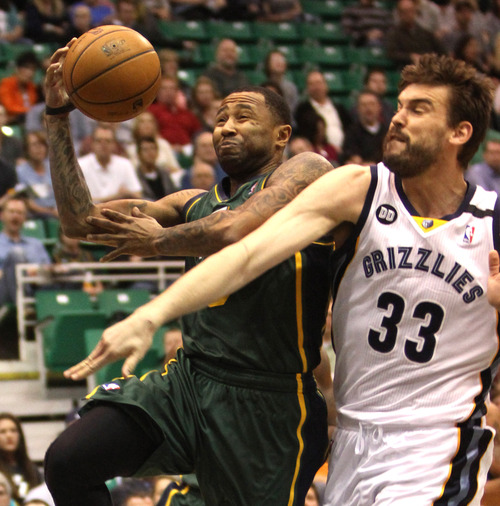This is an archived article that was published on sltrib.com in 2013, and information in the article may be outdated. It is provided only for personal research purposes and may not be reprinted.
Here in Jazzland, amid the search for signs of hope that the hometown franchise can return to a competitive playoff level after three disappointing seasons, the makeup of the NBA's conference semifinalists offers some encouragement.
Memphis, Indiana, San Antonio and Oklahoma City represent four of the league's six other smallest markets, and they're all winning games in the second round of the playoffs.
Another common thread: Earl Watson formerly played for three of those teams. That's not necessarily a suggestion for the Jazz, just an observation.
Some convergence of luck, strategy and suffering enabled those four teams to arrive where they are, making their rise difficult to duplicate. Yet they've demonstrated that market size is not a barrier to succeeding in the NBA.
So scratch that excuse, as the Jazz try to right themselves.
What will it take? The success of those teams basically suggests the Jazz should become terrible in the interest of improving their draft status, and moving to the Eastern Conference also would help.
Actually, Memphis is the Jazz's model. The Grizzlies have done a remarkable building job. They've established an identity for the franchise, which the Jazz clearly lack.
Sure, the Jazz have tried. When they replaced free agents Carlos Boozer and Kyle Korver with two additions in the summer of 2010, the team briefly promoted a theme of "We Just Got Tougher." Looking back, it's sad to think that Raja Bell and Al Jefferson were the centerpieces of those advertisements.
Memphis genuinely is tough. The Grizzlies have become a team that nobody wants to play against, which is the ultimate compliment in the NBA. Toughness is not measured solely by physical play, although that's part of the definition. Those guys have more substance than style, the ability to grind out victories at both ends of the court.
When the team traded Pau Gasol to the Los Angeles Lakers in 2008, nobody could have imagined the Grizzlies being in this position five years later. Jerry Sloan, then the Jazz's coach, described that move as one of "a couple of gifts" — the Jazz's allowing Derek Fisher to escape his contract and sign with L.A. was the other — that the Lakers received.
But that deal eventually netted Darrell Arthur, Quincy Pondexter and Marc Gasol, who's become better than his brother. The Grizzlies also have drafted point guard Mike Conley, acquired and re-signed forward Zach Randolph and signed guard Tony Allen.
And this season, cutting payroll, they traded leading scorer Rudy Gay. That logically should have made the Grizzlies worse, instead of better, but they've improved. And they have a shot at reaching the NBA Finals after earning the Western Conference's No. 5 seed with a 56-26 record.
Indiana's resurgence also has some application for the Jazz. The Pacers drafted Roy Hibbert and Paul George later than the Jazz's Gordon Hayward, Derrick Favors and Enes Kanter were taken, and they traded for George Hill and signed David West. The trouble is that getting good is a lot easier in the East than the West.
Winning the lottery for Tim Duncan makes San Antonio an exceptional story. Same with the Thunder, who started 3-29 in their first season in Oklahoma City. The Jazz's method is trying to become good without being really bad, which is not easy.
In May 2010, being swept by the Lakers in the West semifinals seemed like a low point for the Jazz. Turns out, that's probably as good as they'll get for a while.
They can only hope to become like the Memphis Grizzlies someday, as strange as that sounds.
Twitter: @tribkurt Small-market success
Four of the NBA's seven smallest markets are represented in the conference semifinals. The recent low point for each franchise, compared with its 2012-13 regular-season record:
Team Year Record 2012-13
Indiana 2009-10 32-50 49-32*
Memphis 2008-09 24-58 56-26
Oklahoma City 2008-09 23-59 60-22
San Antonio 1996-97 20-62 58-24
* - Indiana's final game was canceled due to events in Boston.



